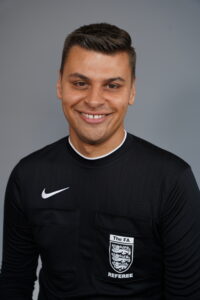As referees, we know that an increasing number of people who are paid to talk about the game don’t know law and can’t admit it when that’s the case. Fikayo Tomori’s foul on Mason Mount and red card at San Siro on Tuesday was the perfect illustration.
Despite decades of the same old pundits calling on players to stay on their feet, by doing exactly that Mount confused many into thinking Tomori’s tug on his shoulder was not enough of an infringement. Once the referee deemed it a foul, then it is a red card. Tomori is not attempting to play the ball in the opinion of the on-field official.
Just because it’s not an act of severe violence doesn’t mean it isn’t a foul. A foul can be soft and still a foul. It’s a fact of Law that Tomori could have slid through the back of Mount, taken player and ball and possibly been shown a yellow card. Don’t hate referees, hate the Law.
So often you hear nonsense: “there wasn’t any intent” – this does, of course, not prevent a foul from being awarded; “there was contact” – this, of course, also does not prevent a foul from being awarded. Here’s the fantastic thing about the Laws of The Game. They are freely available to read. You can get a pdf from the International Football Association Board website if you want.
“As many situations are subjective and match officials are human, some decisions will inevitably be wrong or cause debate and discussion,” it reads on the first page. “For some people, this discussion is part of the game’s enjoyment and attraction but, whether decisions are right or wrong, the ‘spirit’ of the game requires that referees’ decisions must always be respected.”
Mistakes do happen and need to be discussed. But in all the rage regarding VAR when it isn’t perfect, no one mentions it when it overturns a mistake and is used correctly, which the stats suggest is most of the time.
Pundits and fans can be forgiven for not knowing all the Laws. The application of Laws isn’t an individual referee’s choice, it is the application of Law that has been set out by IFAB.
Perhaps the inability to admit ignorance is a consequence of the binary nature of social media where forthright, strong and clear opinion is encouraged over anything else. “I’m not sure about that” will not get a thousand retweets.
What, if anything, is the result of all of this? Ex-professionals misunderstand the Laws, give referees stick, this is then followed by social media accounts with influence redistribute these views and throw out meaningless questions such as: “Was this offside?” Quite often when a subjective tackle happens, these social media accounts will ask an opinion using a still image, from which nobody can tell absolutely anything at all.
Any increasing sense of injustice over a decision grows into all manner of conspiracy theories. There is a massive agenda against [YOUR] club – why has the PGMOL put them in charge of that game when they live slightly closer to the opponents’ stadium?
Top flight referees get abuse that goes beyond any level of being ok. Mike Dean was stood down from officiating a match after receiving online death threats last year.
What About The Grassroots Game?
Does what goes on in the TV studio filter down social media to how officials lower down the pyramid are treated? Last week a 24-year-old was arrested on suspicion of the serious assault of a referee after an grassroots game in Lancashire. Dave Bradshaw sustained “significant injuries” in an attack by a Platt Bridge player during a South Lancashire Counties League match against Wigan Rose.
According to The Guardian, last season, 380 players and coaches received bans for attacking or threatening match officials in English grassroots football. This coming weekend, the Merseyside Youth Football League has cancelled all fixtures after “multiple incidents of inappropriate and threatening behaviour” towards referees. No officials means no football. The FA is going to trial the use of body cameras for grassroots refs to help protect them. It is so demoralising that its come to this. Will this be a wakeup call to those who earn a living from talking about football.
No one individual should be above criticism, but at the moment it is not highlighted enough the fact that it is a very difficult job, with immense pressure, and that we all make mistakes from time to time and so referees naturally will, whether at Old Trafford, at Stockley Park or on Hackney Marshes.
Above all, if we are accusing someone of making a genuine error, people should probably check the Laws and be sure it was a mistake in the first place.
At The Third Team I work individually and in collaboration with different professionals where I have developed workshops and 1-2-1 sessions associated with Resilience and Mental Toughness Development to help referees. The workshops and 1-2-1 sessions are interactive, where referees are encouraged to open up and share their experiences to help themselves and each other.
Feel free to contact me if you’d like to know more about my workshops or 1-2-1 sessions and how I could help you or your officials.
Best Wishes,

Nathan Sherratt
Referee Educator & Managing Director of The Third Team

Nathan Sherratt
Nathan Sherratt, Referee Educator, Resilience Trainer and Managing Director of The Third Team. A Mental Toughness Practitioner based in County Durham, North East England.

